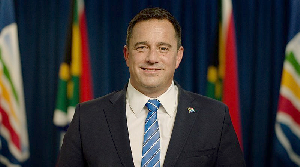- Home - News
- TWI News | TV
- Polls
- Year In Review
- News Archive
- Crime & Punishment
- Politics
- Regional
- Editorial
- Health
- Ghanaians Abroad
- Tabloid
- Africa
- Religion
- Election 2020
- Coronavirus
- News Videos | TV
- Photo Archives
- News Headlines
- Press Release
Business News of Wednesday, 22 June 2016
Source: Isaac Adade-Boateng |thebftonline
Gov’t must tackle loan/Eurobond impunity
You get panicked when you read of financial analysts telling us that, again, our country needs to be rescued by a Eurobond or loan package. It seems loans and Eurobonds are been used to prop up the Ghanaian economy and government spending. The toxic combination of crashing oil prices and fluctuating gold prices etc. have persistently forced us to seek credit to stem our ballooning deficit.
A Bloomberg report captured Mark Bohlund, an intelligence analyst, stressing “failure of Ghana to issue a Eurobond would leave a US$750million hole in the 2016 budget, with an additional US$250million needed to repay debt. On the other hand, the nation is also considering seeking syndicated loan to reduce budget deficit”.
The report continued that the finance ministry says, “Proceeds from syndicated loans will also be used to refinance dollar bonds maturing in October 2017, with a US$531million balance outstanding. A balance of US$257million available from last year Eurobond proceeds and past oil revenue savings, currently amounting to US$105million, will also be used to refinance the debt maturing in 2017. Ghana may still sell a bond if oil prices rise,” the finance ministry was quoted as saying.
With so much depending on foreign loans, the economy is only importing problems for the future. The debt servicing burden is seemingly reaching unsustainable levels. What’s actually the logic in taking loans to service loans? In our normal individual lives this would look weird, but we doing so as a nation.
Our economy is not sick, the real vulnerability now is our over-dependence on a single source of revenue – credits. It is the annual flow of external debt servicing relative to the foreign exchange earning capacity that constitutes a crippling burden. The proclivity of having easy access to loans brings about vulnerability and laziness.
We have taken up the loan mantra, and we have kept on repeating it for years now. The foreign loans, grants and investments are the mantras our policymakers are parroting. And the repetition of these mantras as short-term solutions has eliminated our ability to build any other economic model for the country.
Once, in 1924, Charles G. Dawes - a wealthy Chicago banker - was sought to lead a committee that formulated the Dawes Plan to save Germany from an economic reparation. Dawes had his brilliant strategy to rescue Germany. Importantly, he facilitated a series of massive loans. First, 800 million marks, was pumped into the German industrial sector. It was a vigorous piece of financial manipulation and seemed to be a work of a clever man, with Dawes being taken for a wizard.
It was concluded that he had found a cure -- but he had only discovered a short-term palliative, since his tinkering created large problems for the future. However, tolerating tinkering for loans was the style tolerated in the German government of 1924. However, Germany later on continued to default and, hence, negotiated an agreement to spread the repayment over a 59-year period -- with the final payment to be made in 1988.
Just how the German government then acted irresponsibly with loans is exactly our Eurobond and loans attitude. We are so addicted to loans and bonds. This addiction is so chronic that we cannot function without a constant supply of this financial medication.
The Eurobond phenomenon has caught up with other African countries as well. African countries now submit to more debt restructuring than various other continents. And as the debt situation grows, there is huge concern over a threat that once again can take us over painful experiences of some past decades.
One sub-Saharan nation after another is jumping into the debt market. The trend has seen interest rates rising, which also raises the likelihood of default due to higher rates. Ghana has increased the former 7.5 percent for market jitters to 10 percent.
Not that Loans and Eurobonds are bad -- but they must not be the order of the day. We need a combination of things to diversify our economy. We also need a commitment to avoid costly duplicity in what we use the loans for. There are other encumbrances that often pass unquantified, yet they greatly cripple or hinder putting up of projects for growth.
Projects are good and necessary as they contribute to tangible productivity, but they should be within plans and not driven by the urge to tick off a political wish-list. We need set-ups that will not blow up the Treasury but are instead carefully planned and feasible.
Indeed, none seem to care about the sound of warning bells or spelling out measures to tackle Ghana’s addiction for Eurobond and loans. However, a bit of caution must be employed as the damage may take years to fix.











